Fleurs du Mal Magazine


Or see the index

Amy Levy
(1861-1889)
Ballade of a Special Edition
He comes; I hear him up the street–
Bird of ill omen, flapping wide
The pinion of a printed sheet,
His hoarse note scares the eventide.
Of slaughter, theft, and suicide
He is the herald and the friend;
Now he vociferates with pride–
A double murder in Mile End!
A hanging to his soul is sweet;
His gloating fancy’s fain to bide
Where human-freighted vessels meet,
And misdirected trains collide.
With Shocking Accidents supplied,
He tramps the town from end to end.
How often have we heard it cried–
A double murder in Mile End.
War loves he; victory or defeat,
So there be loss on either side.
His tale of horrors incomplete,
Imagination’s aid is tried.
Since no distinguished man has died,
And since the Fates, relenting, send
No great catastrophe, he’s spied
This double murder in Mile End.
Fiend, get thee gone! no more repeat
Those sounds which do mine ears offend.
It is apocryphal, you cheat,
Your double murder in Mile End.
Amy Levy poetry
fleursdumal.nl magazine
More in: Amy Levy, Archive K-L, Levy, Amy
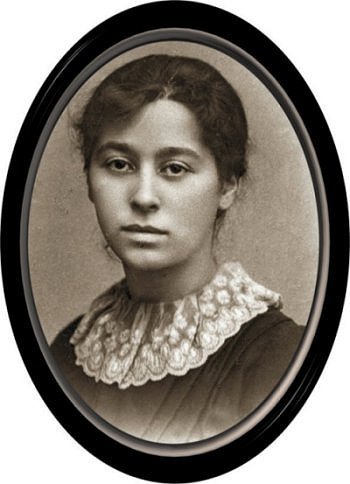
Amy Levy
(1861-1889)
Borderland
Am I waking, am I sleeping?
As the first faint dawn comes creeping
Thro’ the pane, I am aware
Of an unseen presence hovering,
Round, above, in the dusky air:
A downy bird, with an odorous wing,
That fans my forehead, and sheds perfume,
As sweet as love, as soft as death,
Drowsy-slow through the summer-gloom.
My heart in some dream-rapture saith,
It is she. Half in a swoon,
I spread my arms in slow delight.–
O prolong, prolong the night,
For the nights are short in June!
Amy Levy poetry
fleursdumal.nl magazine
More in: Amy Levy, Archive K-L, Levy, Amy
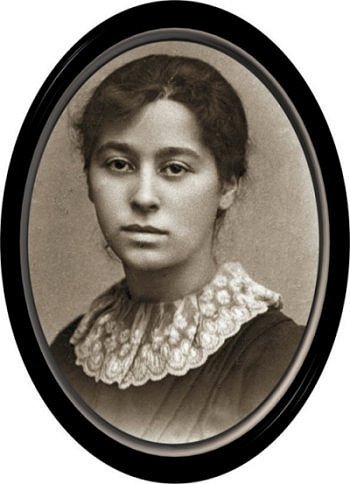
Amy Levy
(1861-1889)
Christopher Found
I
At last; so this is you, my dear!
How should I guess to find you here?
So long, so long, I sought in vain
In many cities, many lands,
With straining eyes and groping hands;
The people marvelled at my pain.
They said: “But sure, the woman’s mad;
What ails her, we should like to know,
That she should be so wan and sad,
And silent through the revels go?”
They clacked with such a sorry stir!
Was I to tell? were they to know
That I had lost you, Christopher?
Will you forgive me for one thing?
Whiles, when a stranger came my way,
My heart would beat and I would say :
” Here’s Christopher!” –then lingering
With longer gaze, would turn away
Cold, sick at heart. My dear, I know
You will forgive me for this thing.
It is so very long ago
Since I have seen your face–till now;
Now that I see it–lip and brow,
Eyes, nostril, chin, alive and clear;
Last time was long ago; I know
This thing you will forgive me, dear.
II
There is no Heaven–This is the best;
O hold me closer to your breast;
Let your face lean upon my face,
That there no longer shall be space
Between our lips, between our eyes.
I feel your bosom’s fall and rise.
O hold me near and yet more near;
Ah sweet ; I wonder do you know
How lone and cold, how sad and drear,
Was I a little while ago;
Sick of the stress, the strife, the stir;
But I have found you, Christopher.
III
If only you had come before!
(This is the thing I most deplore)
A seemlier woman you had found,
More calm, by courtesies more bound,
Less quick to greet you, more subdued
Of appetite; of slower mood.
But ah! you come so late, so late!
This time of day I can’t pretend
With slight, sweet things to satiate
The hunger-cravings. Nay, my friend,
I cannot blush and turn and tremble,
Wax loth as younger maidens do.
Ah, Christopher, with you, with you,
You would not wish me to dissemble?
IV
So long have all the days been meagre,
With empty platter, empty cup,
No meats nor sweets to do me pleasure,
That if I crave–is it over-eager,
The deepest draught, the fullest measure,
The beaker to the brim poured up?
V
Shelley, that sprite from the spheres above,
Says, and would make the matter clear,
That love divided is larger love;–
We’ll leave those things to the bards, my dear.
For you never wrote a verse, you see;
And I–my verse is not fair nor new.
Till the world be dead, you shall love but me,
Till the stars have ceased, I shall love but you.
EPILOGUE
Thus ran the words; or rather, thus did run
Their purport. Idly seeking in the chest
(You see it yonder), I had found them there:
Some blotted sheets of paper in a case,
With a woman’s name writ on it: “Adelaide.”
Twice on the writing there was scored the date
Of ten years back; and where the words had end
Was left a space, a dash, a half-writ word,
As tho’ the writer minded, presently
The matter to pursue.
I questioned her,
That worthy, worthy soul, my châtelaine,
Who, nothing loth, made answer.
There had been
Another lodger ere I had the rooms,
Three months gone by–a woman.
“Young, sir ? No.
Must have seen forty if she’d seen a day!
A lonesome woman; hadn’t many friends;
Wrote books, I think, and things for newspapers.
Short in her temper–eyes would flash and flame
At times, till I was frightened. Paid her rent
Most regular, like a lady.
Ten years back,
They say (at least Ann Brown says), ten years back
The lady had a lover. Even then
She must have been no chicken.
Three months since
She died. Well, well, the Lord is kind and just.
I did my best to tend her, yet indeed
It’s bad for trade to have a lodger die.
Her brother came, a week before she died:
Buried her, took her things, threw in the fire
The littered heaps of paper.
Yes, the sheets,
They must have been forgotten in the chest;–
I never knew her name was Adelaide.”
Amy Levy poetry
fleursdumal.nl magazine
More in: Amy Levy, Archive K-L, Levy, Amy
.jpg)
Amy Levy
(1861-1889)
A Farewell
(After Heine.)
The sad rain falls from Heaven,
A sad bird pipes and sings ;
I am sitting here at my window
And watching the spires of “King’s.”
O fairest of all fair places,
Sweetest of all sweet towns!
With the birds, and the greyness and greenness,
And the men in caps and gowns.
All they that dwell within thee,
To leave are ever loth,
For one man gets friends, and another
Gets honour, and one gets both.
The sad rain falls from Heaven;
My heart is great with woe–
I have neither a friend nor honour,
Yet I am sorry to go.
Amy Levy poetry
fleursdumal.nl magazine
.jpg)
Amy Levy
(1861-1889)
To Vernon Lee
On Bellosguardo, when the year was young,
We wandered, seeking for the daffodil
And dark anemone, whose purples fill
The peasant’s plot, between the corn-shoots sprung.
Over the grey, low wall the olive flung
Her deeper greyness ; far off, hill on hill
Sloped to the sky, which, pearly-pale and still,
Above the large and luminous landscape hung.
A snowy blackthorn flowered beyond my reach;
You broke a branch and gave it to me there;
I found for you a scarlet blossom rare.
Thereby ran on of Art and Life our speech;
And of the gifts the gods had given to each–
Hope unto you, and unto me Despair
Amy Levy poetry
fleursdumal.nl magazine
More in: Amy Levy, Archive K-L, Levy, Amy
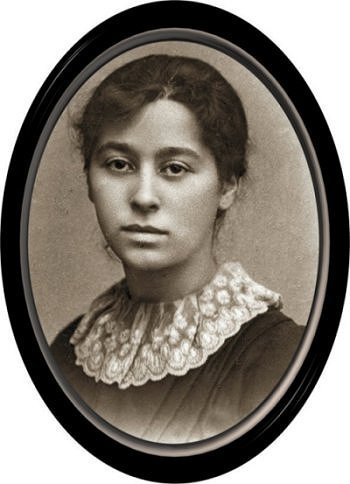
Amy Levy
(1861-1889)
Ballade of an Omnibus
“To see my love suffices me.”
Ballades in Blue China
Some men to carriages aspire;
On some the costly hansoms wait;
Some seek a fly, on job or hire;
Some mount the trotting steed, elate.
I envy not the rich and great,
A wandering minstrel, poor and free,
I am contented with my fate —
An omnibus suffices me.
In winter days of rain and mire
I find within a corner strait;
The ‘busmen know me and my lyre
From Brompton to the Bull-and-Gate.
When summer comes, I mount in state
The topmost summit, whence I see
Crœsus look up, compassionate —
An omnibus suffices me.
I mark, untroubled by desire,
Lucullus’ phaeton and its freight.
The scene whereof I cannot tire,
The human tale of love and hate,
The city pageant, early and late
Unfolds itself, rolls by, to be
A pleasure deep and delicate.
An omnibus suffices me.
Princess, your splendour you require,
I, my simplicity; agree
Neither to rate lower nor higher.
An omnibus suffices me.
Amy Levy poetry
fleursdumal.nl magazine
More in: Amy Levy, Archive K-L, Levy, Amy
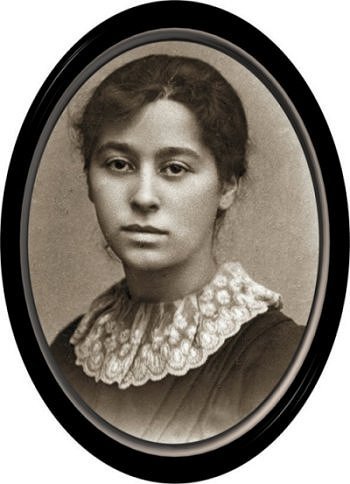
Amy Levy
(1861-1889)
A June-Tide Echo
(After a Richter Concert)
In the long, sad time, when the sky was grey,
And the keen blast blew through the city drear,
When delight had fled from the night and the day,
My chill heart whispered, ” June will be here!
” June with its roses a-sway in the sun,
Its glory of green on mead and tree.”
Lo, now the sweet June-tide is nearly done,
June-tide, and never a joy for me
Is it so much of the gods that I pray?
Sure craved man never so slight a boon!
To be glad and glad in my heart one day–
One perfect day of the perfect June.
Sweet sounds to-night rose up, wave upon wave;
Sweet dreams were afloat in the balmy air.
This is the boon of the gods that I crave–
To be glad, as the music and night were fair.
For once, for one fleeting hour, to hold
The fair shape the music that rose and fell
Revealed and concealed like a veiling fold;
To catch for an instant the sweet June spell.
For once, for one hour, to catch and keep
The sweet June secret that mocks my heart;
Now lurking calm, like a thing asleep,
Now hither and thither with start and dart.
Then the sick, slow grief of the weary years,
The slow, sick grief and the sudden pain;
The long days of labour, the nights of tears–
No more these things would I hold in vain.
I would hold my life as a thing of worth;
Pour praise to the gods for a precious thing.
Lo, June in her fairness is on earth,
And never a joy does the niggard bring.
Amy Levy poetry
fleursdumal.nl magazine
More in: Amy Levy, Archive K-L, Levy, Amy
.jpg)
Amy Levy
(1861-1889)
Epitaph
(On a Commonplace Person Who Died in Bed)
THIS is the end of him, here he lies:
The dust in his throat, the worm in his eyes,
The mould in his mouth, the turf on his breast;
This is the end of him, this is best.
He will never lie on his couch awake,
Wide-eyed, tearless, till dim daybreak.
Never again will he smile and smile
When his heart is breaking all the while.
He will never stretch out his hands in vain
Groping and groping–never again.
Never ask for bread, get a stone instead,
Never pretend that the stone is bread.
Never sway and sway ‘twixt the false and true,
Weighing and noting the long hours through.
Never ache and ache with chok’d-up sighs;
This is the end of him, here he lies.
Amy Levy poetry
fleursdumal.nl magazine
More in: Amy Levy, Archive K-L, Levy, Amy
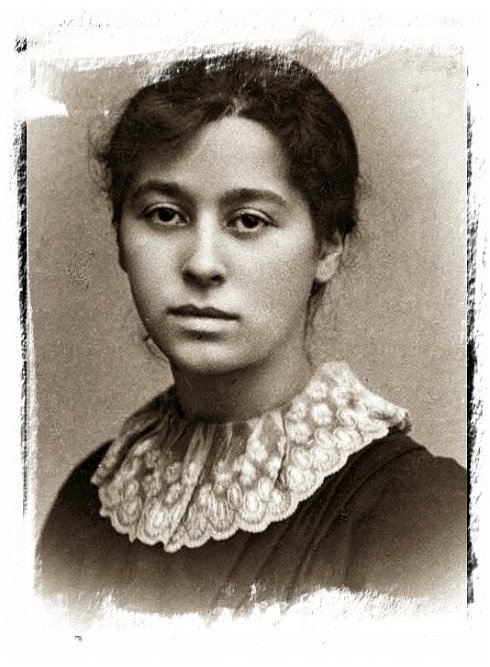
Amy Levy
(1861-1889)
A Greek Girl
I may not weep, not weep, and he is dead.
A weary, weary weight of tears unshed
Through the long day in my sad heart I bear;
The horrid sun with all unpitying glare
Shines down into the dreary weaving-room,
Where clangs the ceaseless clatter of the loom,
And ceaselessly deft maiden-fingers weave
The fine-wrought web; and I from morn till eve
Work with the rest, and when folk speak to me
I smile hard smiles; while still continually
The silly stream of maiden speech flows on:–
And now at length they talk of him that’s gone,
Lightly lamenting that he died so soon–
Ah me! ere yet his life’s sun stood at noon.
Some praise his eyes, some deem his body fair,
And some mislike the colour of his hair!
Sweet life, sweet shape, sweet eyes, and sweetest hair,
What form, what hue, save Love’s own, did ye wear?
I may not weep, not weep, for very shame.
He loved me not. One summer’s eve he came
To these our halls, my father’s honoured guest,
And seeing me, saw not. If his lips had prest
My lips, but once, in love; his eyes had sent
One love-glance into mine, I had been content,
And deemed it great joy for one little life;
Nor envied other maids the crown of wife:
The long sure years, the merry children-band–
Alas, alas, I never touched his hand!
And now my love is dead that loved not me.
Thrice-blest, thrice-crowned, of gods thrice-lovèd she–
That other, fairer maid, who tombward brings
Her gold, shorn locks and piled-up offerings
Of fragrant fruits, rich wines, and spices rare,
And cakes with honey sweet, with saffron fair;
And who, unchecked by any thought of shame,
May weep her tears, and call upon his name,
With burning bosom prest to the cold ground,
Knowing, indeed, that all her life is crown’d,
Thrice-crowned, thrice honoured, with that love of his;–
No dearer crown on earth is there, I wis.
While yet the sweet life lived, more light to bear
Was my heart’s hunger; when the morn was fair,
And I with other maidens in a line
Passed singing through the city to the shrine,
Oft in the streets or crowded market-place
I caught swift glimpses of the dear-known face;
Or marked a stalwart shoulder in the throng;
Or heard stray speeches as we passed along,
In tones more dear to me than any song.
These, hoarded up with care, and kept apart,
Did serve as meat and drink my hungry heart.
And now for ever has my sweet love gone;
And weary, empty days I must drag on,
Till all the days of all my life be sped,
By no thought cheered, by no hope comforted.
For if indeed we meet among the shades,
How shall he know me from the other maids?–
Me, that had died to save his body pain!
Alas, alas, such idle thoughts are vain!
O cruel, cruel sunlight, get thee gone!
O dear, dim shades of eve, come swiftly on!
That when quick lips, keen eyes, are closed in sleep,
Through the long night till dawn I then may weep.
Amy Levy poetry
fleursdumal.nl magazine
More in: Amy Levy, Archive K-L, Levy, Amy
.jpg)
Amy Levy
(1861-1889)
A March Day in London
The east wind blows in the street to-day;
The sky is blue, yet the town looks grey.
‘Tis the wind of ice, the wind of fire,
Of cold despair and of hot desire,
Which chills the flesh to aches and pains,
And sends a fever through all the veins.
From end to end, with aimless feet,
All day long have I paced the street.
My limbs are weary, but in my breast
Stirs the goad of a mad unrest.
I would give anything to stay
The little wheel that turns in my brain;
The little wheel that turns all day,
That turns all night with might and main.
What is the thing I fear, and why?
Nay, but the world is all awry–
The wind’s in the east, the sun’s in the sky.
The gas-lamps gleam in a golden line;
The ruby lights of the hansoms shine,
Glance, and flicker like fire-flies bright;
The wind has fallen with the night,
And once again the town seems fair
Thwart the mist that hangs i’ the air.
And o’er, at last, my spirit steals
A weary peace ; peace that conceals
Within its inner depths the grain
Of hopes that yet shall flower again.
Amy Levy poetry
fleursdumal.nl magazine
.jpg)
Amy Levy
(1861-1889)
A London Plane-Tree
Green is the plane-tree in the square,
The other trees are brown;
They droop and pine for country air;
The plane-tree loves the town.
Here from my garret-pane, I mark
The plane-tree bud and blow,
Shed her recuperative bark,
And spread her shade below.
Among her branches, in and out,
The city breezes play;
The dun fog wraps her round about;
Above, the smoke curls grey.
Others the country take for choice,
And hold the town in scorn;
But she has listened to the voice
On city breezes borne.
Amy Levy poetry
fleursdumal.nl magazine
Thank you for reading Fleurs du Mal - magazine for art & literature